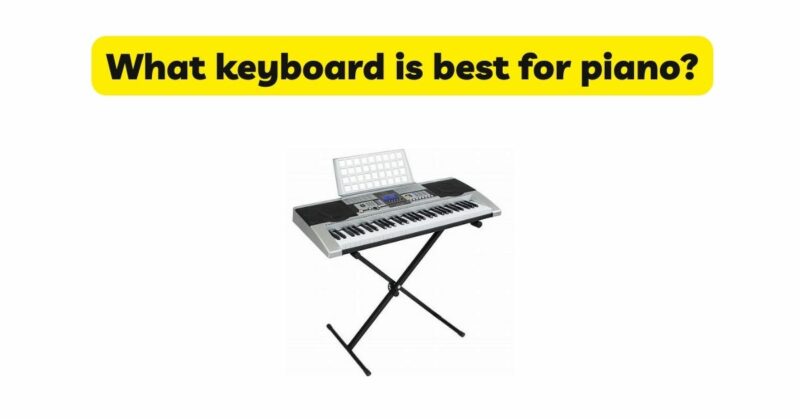Selecting the right keyboard for piano players is a crucial decision that can greatly impact one’s musical journey. With a plethora of options available, it’s important to identify the keyboards that offer the best piano-playing experience. In this article, we delve into the factors that make a keyboard ideal for piano players, including key considerations such as keyboard types, key action, sound quality, realism, touch sensitivity, portability, and additional features. By examining these factors, we aim to provide insights into the best keyboards for piano players and help readers make an informed decision that suits their musical preferences and aspirations.
- Keyboard Types: When it comes to keyboard types, weighted keyboards with hammer action are widely regarded as the best choice for piano players. These keyboards emulate the feel and response of an acoustic piano, providing the closest approximation to the touch sensitivity of traditional piano keys. Weighted keyboards use mechanical systems to replicate the weighted keys found in acoustic pianos, offering a more authentic playing experience.
- Key Action: The key action of a keyboard is a crucial factor for piano players. Keyboards with fully weighted or graded hammer action provide the most realistic touch and response, mimicking the feel of the hammers striking the strings in an acoustic piano. The key action should be responsive and sensitive, allowing for nuanced dynamics and expressive playing.
- Sound Quality and Realism: The sound quality and realism of the piano sounds produced by the keyboard are paramount for piano players. Keyboards that utilize high-quality sound sampling technology, capturing the nuances of acoustic pianos, offer the most authentic piano tones. Look for keyboards that feature multi-layered samples and velocity-sensitive keys to achieve a dynamic range that closely resembles an acoustic piano.
- Touch Sensitivity: Touch sensitivity is an important feature for piano players, as it allows for expressive playing and dynamic control. Keyboards with touch-sensitive keys respond to the player’s touch and produce different volumes and tones based on the intensity of the key press. This feature enables pianists to convey emotions and nuances in their performances.
- Portability and Size: For piano players who need a portable option, considering the size and weight of the keyboard is essential. Compact and lightweight keyboards with 88 keys offer a balance between portability and playability. Look for keyboards that strike the right balance between being easily transportable while still providing a realistic piano-playing experience.
- Additional Features: While the focus is on piano-playing capabilities, additional features can enhance the overall experience. Look for keyboards with built-in metronomes, recording functionality, MIDI connectivity, and the ability to layer or split sounds. These features can support practice sessions, composition, and performance versatility.
- Brand Reputation and Customer Reviews: Consider the brand reputation and read customer reviews to gauge the reliability, build quality, and customer satisfaction of a keyboard. Well-established brands with a track record of producing high-quality instruments are often a safe choice. However, it’s important to evaluate each model individually, considering factors like specific features and value for money.
Conclusion: Finding the best keyboard for piano players involves considering factors such as keyboard types, key action, sound quality, realism, touch sensitivity, portability, and additional features. Weighted keyboards with hammer action, offering authentic touch and response, are often favored by piano players. Look for keyboards that produce high-quality and realistic piano sounds through advanced sound sampling technology. Touch-sensitive keys enable expressive playing, and portability becomes important for those who require a mobile instrument. Additional features can enhance the overall experience, but the focus should remain on the piano-playing capabilities. Consider brand reputation and customer reviews to ensure reliability and customer satisfaction. By carefully evaluating these factors, piano players can find a keyboard that truly emulates the essence of playing a piano and enhances their musical journey.


